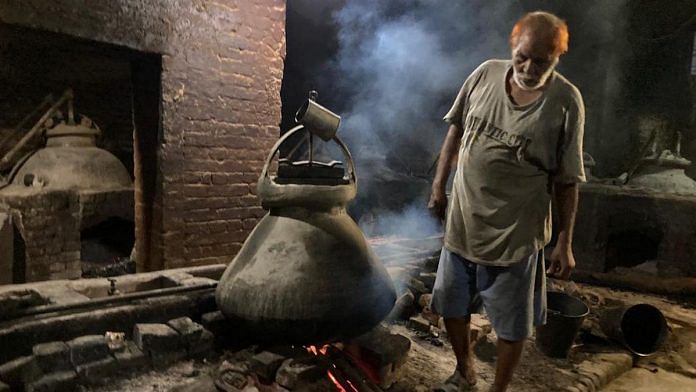Kannauj: “Harm never befalls those who do rajneeti (politics). Only the people get crushed,” an attar manufacturer rued at his sweet-smelling showroom in the heart of Bada Bazaar in Uttar Pradesh’s Kannauj, known as India’s perfume capital.
Here, the heady scents of damask roses, vetiver, and sandalwood linger in the air, becoming stronger in shops where perfumers sell tiny glass bottles filled with attar or ittar — oil-based botanical perfumes, created using age-old deg-bhapka (steam-distillation) techniques.
Yet, a promise for the future — the International Perfume Museum and Park (now called the Attar Park), an ambitious project proposed six years ago by UP’s former Samajwadi Party government — seems to have mostly gone up in smoke.
About 20 kilometres from Bada Bazaar, along the Agra-Lucknow Expressway, lies the site of the project, conceived of as an exchange of technical expertise between Kannauj and the French perfume capital, Grasse.
An expected outcome was greater international exposure and a branding boost for the UP town, whose perfumes are have a modest market in West Asia and are also used in the olfactory compositions of European perfumers.
But since April 2016, when then chief minister Akhilesh Yadav laid the foundation stone for the project, only mounds of rubble and soil have come up within the boundary wall, a stark contrast to the futuristic orchid-like building envisioned on the project’s website.
Many traders and manufacturers in Kannauj blame “lack of interest” from the state’s Yogi Adityanath-led BJP government, in power since March 2017, for the project’s neglected state. They also complain that though work has purportedly started over the last few months, the project’s scope has been significantly reduced.
During a discussion on the UP Budget in the assembly in May, Akhilesh, who is now Leader of the Opposition, accused the BJP government of not allocating money for Kannauj’s attar industry, which comes under the purview of the state’s One District One Product (ODOP) initiative to encourage traditional enterprises.
“You may not like ittar,” he said, “but everyone likes fragrance.” He pointed out that while the perfume park gathered dust, a gobar (cow dung) gas plant had been granted a budgetary allocation.
Speaking to ThePrint, BJP leader and Kannauj MP Subrat Pathak, however, said that the perfume park represented “pure politics” during the Akhilesh regime, and that the Yogi government was implementing it.
While government officials and local residents said the park had been “stalled” for years, Pathak claimed that the first phase of the project was expected to be completed by the end of the year.
As of now, the budget of the project has reportedly been reduced to Rs 100 crore from the estimated Rs 257 crore of the original plan, and the land allotted reduced from 100 acres to just under half that, causing considerable frustration in Kannauj’s beleaguered attar industry.
Also Read: Where even drains smell of roses — inside India’s perfumery Kannauj
An ancient industry under duress
Kannauj was in the business of aromas well before the Mughals arrived and boosted demand, and it continues to be a key manufacturing centre for natural perfumes, oils, essences, incense sticks, and other fragrance products.
When asked about the origins of the local perfume industry, Pawan Trivedi, president of the Attars and Perfumers Association of Kannauj, quoted from the Maha Mrityunjaya Mantra, a verse from the Rigveda, which uses the word “sugandhim” or fragrant to describe Lord Shiva.
According to him, this is a clue that attars existed as far back as Vedic times.
Currently, there are around 350 manufacturing units in the town and its environs, providing employment to at least 5,00,000 people, and generating an annual turnover of about Rs 200 crore, according to the association.
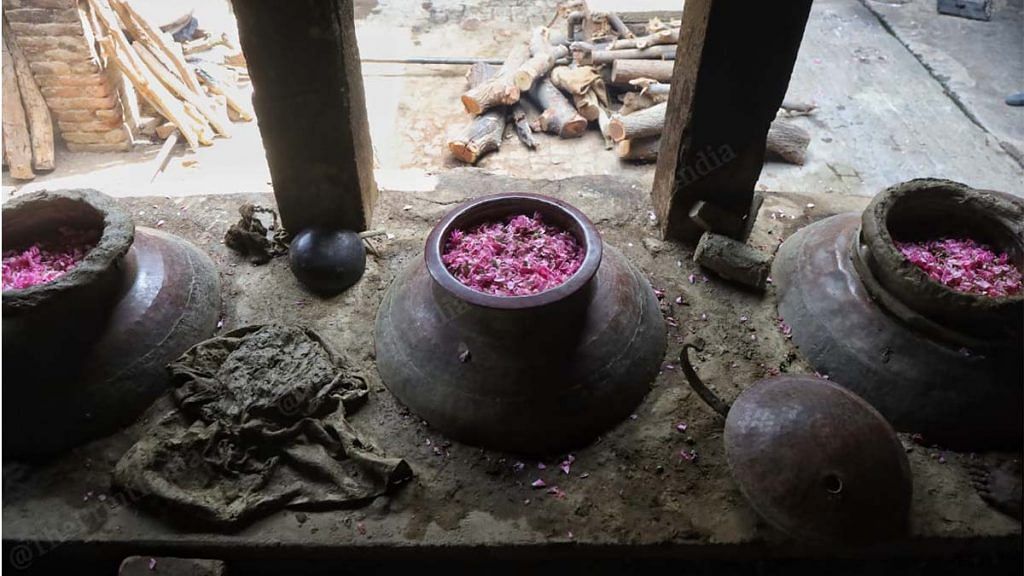
However, the industry here has been in decline for several years now, with rising costs of raw materials and tapering demand hitting profits.
A rejuvenation of the flagging industry was the rationale behind the Akhilesh government’s proposal for a perfume park.
Trivedi told ThePrint that the prospect of this development had raised the hopes of manufacturers about establishing a more prominent place on the global map.
“The attars of Kannauj are unique and original to the manufacturers of the city, but we lack marketing, branding, and support from the government. Had we been able to market ourselves better, we could progress more,” he said.
Perfume park’s ambitious beginnings
The vision for the International Perfume Museum and Park first took shape in 2015, when Akhilesh and his wife, then Kannauj MP Dimple Yadav, visited Grasse to chalk out a tie-up.
At first, initial documents show, the idea was for the grand project to come up on 400 acres of land, under the aegis of the Uttar Pradesh State Industrial Development Authority (UPSIDA).
Of this, 300 acres were slated to come from the “gram sabha” land available at the site, while the remaining 100 acres needed to be “arranged” through land acquisition from farmers.
Key components of the project included an attar “manufacturing zone” for advanced distillation and extraction units in two villages along the Thatiya road, as well as a museum and auditorium, among other buildings.
As part of the Kannauj-Grasse pact, it was also announced that groups of students would be sent to the French town for training programmes.
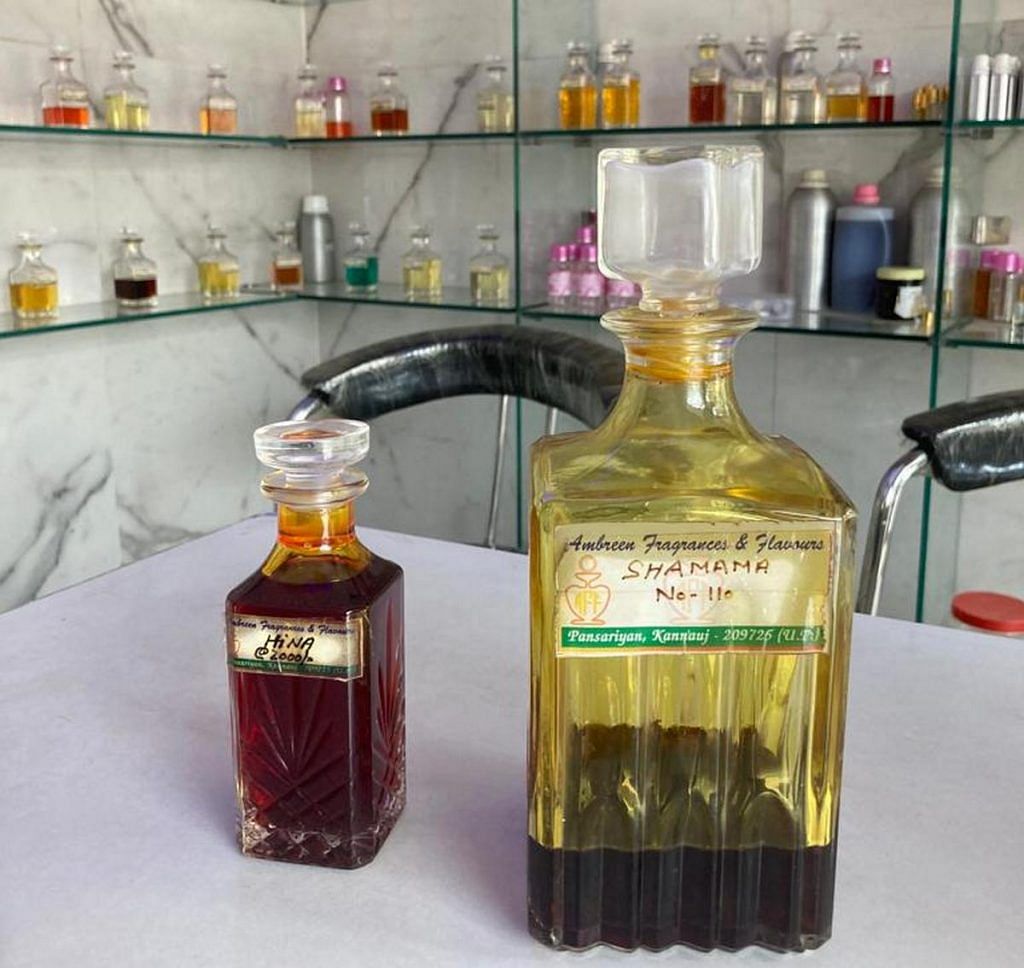
However, Rakesh Jha, the UPSIDA regional manager who was overseeing the project, said that roadblocks in the land acquisition process sobered these ambitions and a fresh plan was prepared for the project, covering a total of 100 acres. “Of this, 31 acres were identified for work in the first phase,” he said.
Other than land acquisition issues, the project also hit a legal bump when UPSIDA decided to replace a company it had hired to implement the project.
Finally, in April 2016, a year before the assembly polls, Akhilesh Yadav laid the foundation stone of the International Perfume Museum and Park in Tirwa tehsil of Kannauj. The first phase of the project kicked off, at least in name, on 28 acres out of the 31 acres identified, with a completion target of two years.
‘Project was stalled for 4.5 years’
In March 2017, a BJP government came to power under the leadership of Yogi Adityanath.
The Adityanath government intended to take the project forward but reportedly cited issues such as the land acquisition process being incomplete, a lack of clarity about the viability of the concept, and the need to include the word “attar” in the project’s name.
After that, local residents allege, the work remained stalled until just ahead of the 2022 assembly elections.
“The work remained stalled for four-and-a-half years since the announcement in April 2016. Work on the boundary wall started six months back, just before the assembly elections,” Trivedi said.
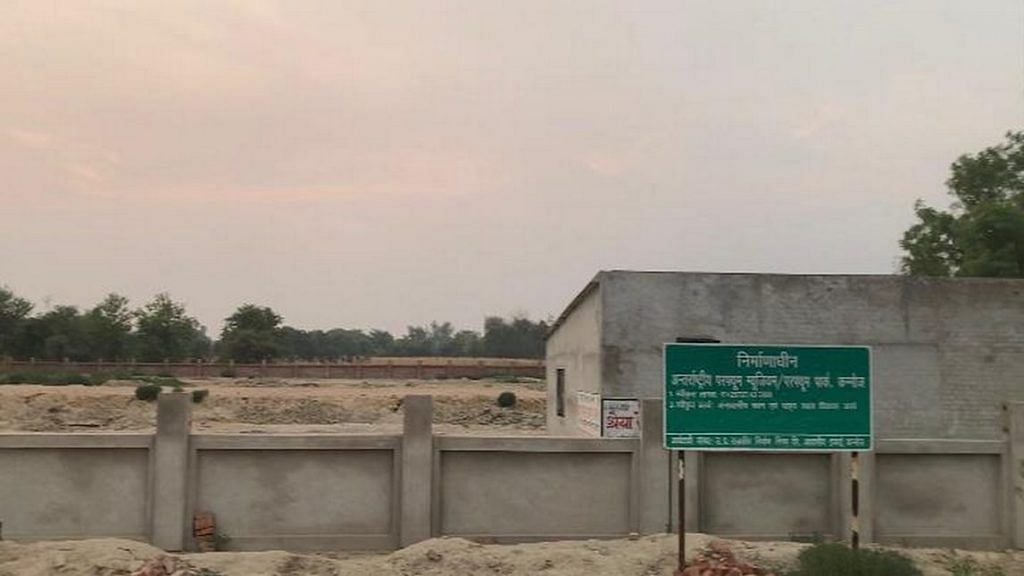
He claimed that the current government has not demonstrated much enthusiasm about the project, and that this was affecting investors’ interest in it.
“If you start by questions like how many (manufacturers) will come, will someone come or not? It is natural that even investors would get discouraged,” he said.
Another attar manufacturer observed: “The project is mainly suffering because of lack of interest of the current regime. Since, the project has been downsized, the manufacturers are also in dilemma about it. The project has been stalled for over four years… it hints at what the government is thinking.”
A massive downsizing
Government officials admit that the work had been stalled for a while, but that it is now under way.
Speaking to ThePrint, Kannauj District Magistrate R.K. Mishra said that that the work had started and there were plans to “acquire more land for setting up of the manufacturing zone”.
However, the scope of the project has diminished considerably. Instead of 100 acres, it will be built on 50-odd acres. Further, according to information from the UPSIDA, it will likely be able to accommodate only 38 industrial units, whereas 90-100 manufacturers are interested in setting up here. The current budget for the project has also been reduced to Rs 100 crore.
Giving further details, additional district magistrate (finance/revenue) Gajendra Kumar said that 31 acres of land is available at present, of which work has begun on 28 acres. “After this, another 29 acres of land will be acquired. The project will cover a total of 59 acres,” Kumar said.
According to Trivedi, this downsizing has come as a huge disappointment.
“When applications were first invited for the project, around 80-90 perfumers expressed their desire to set up units there,” he said. “However, now, the government is only going ahead with a little over 50 acres of land, out of which they are offering only 38 industrial units to the manufacturers who want to set up their units in the park.”
Another major perfumer registered the same complaint: “The government changed the old proposal and came up with a new one, under which the number of the industrial plots meant for allocation to the manufacturers was greatly reduced.”
However, Principal Secretary, MSME, Navneet Sehgal told ThePrint that the government will try to allot plots to all the interested manufacturers.
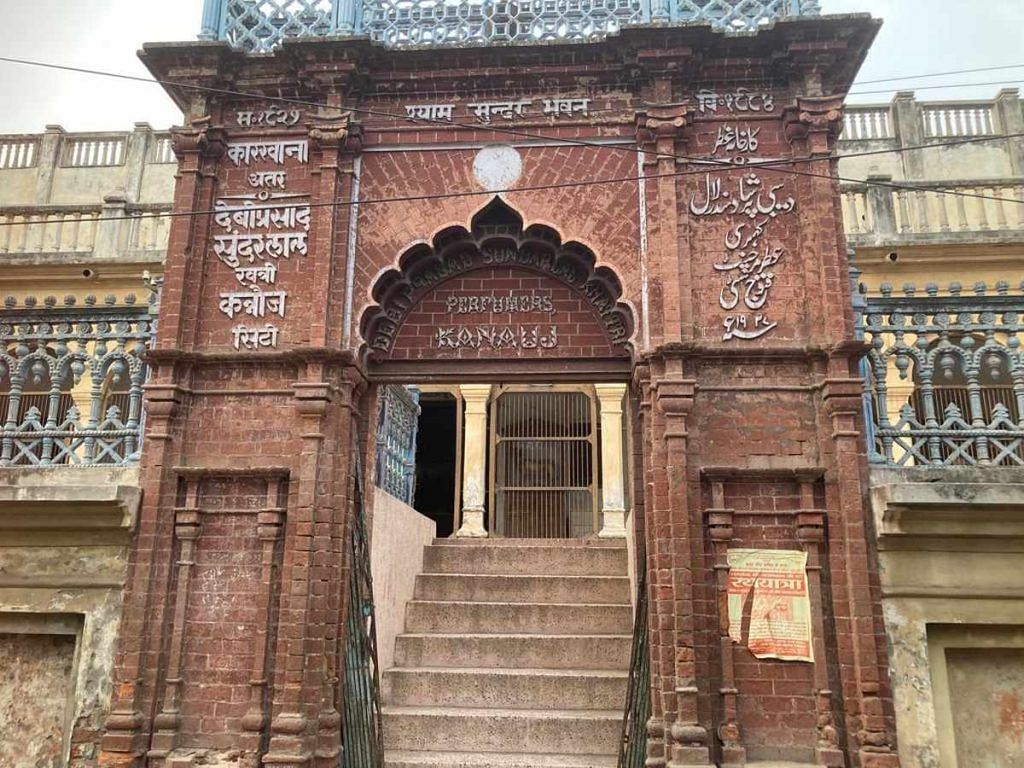
Land lease charges too ‘steep’
The perfumers of Kannauj are also incensed that they are being offered industrial plots at a rate of Rs 6,000 per square metre (1 acre is just over 4,000 square metres), which they say is too “steep” for them.
Perfumers say they have held several meetings with CM Yogi Adityanath, the chief secretary, and the principal secretary (MSME) over the past few years.
“We had a meeting with the former chief secretary Anoop Chandra Pandey in 2018 and had also met the CM around three years ago. However, nothing happened on the ground and our concerns remain unaddressed,” Trivedi said.
According to some manufacturers, UP should take a cue from neighbouring Uttarakhand’s upcoming Aroma Park project.
“In Uttarakhand’s Kashipur, interested aromatic industries are getting an industrial plot for Rs 2,500 per square metre in the Aroma Park project. If they can give for such a reasonable price, why not the UP government?” asked another perfumer in Bada Bazaar.
Trivedi said that his association had suggested to the government that a team of UPSIDA — the implementation agency — be sent to Kashipur to understand how they are offering land at cheaper rates.
When asked about this, Mayank Mangal, regional manager, UPSIDA Kanpur, claimed that comparing UP to Uttarakhand was not possible because the latter was a “hilly state”.
Asked about the “steep rate” and the manufacturers demanding a subsidy, MSME principal secretary Navneet Sethi said that they are “trying” to do it.
‘Politics is to blame’
On condition of anonymity, many Kannauj perfumers cite one of their biggest worries: The effects of politics.
The city, which was the Lok Sabha constituency of Akhilesh Yadav’s wife Dimple for two terms, until 2019, was viewed as a Samajwadi Party stronghold, which perfumers say has worked against them.
Many here speak of their fears about the industry being on the radar of the GST and income tax authorities.
In December last year, photos went viral of thick stacks of cash, reportedly amounting to more than Rs 150 crore, allegedly recovered from the house of Piyush Jain, the Kanpur-based owner of Trimurti Fragrance.
A political stink ensued — while Prime Minister Narendra Modi remarked on the “perfume of corruption” sprinkled across the state by the SP, Akhilesh Yadav alleged that Jain enjoyed patronage from the BJP.
Meanwhile, there was speculation that the “wrong” Jain had been nabbed since another perfume baron with the same last name had launched a scent called ‘Samajwadi Itr’ the previous month. Days later, this businessman, the Samajwadi Party MLC Pushparaj Jain, was also in the IT net. After multiple raids on his properties, he was accused of income tax evasion.
“This has become a disturbing trend. If we raise any issue, we may be branded as being pro-SP and who knows what happens afterwards?” a perfumer said on condition of anonymity.
Like others here, he blamed “politics” for the state of the perfume park project.
“The project was initiated during the SP government, but the current government does not seem to be wanting to go ahead with it with the same enthusiasm and has reduced its size as well as budget,” the perfumer said.
The SP also maintains that the project was overlooked in the budget session. “Because it was started by former CM and SP chief Akhilesh Yadav and because Kannauj has earlier been the stronghold of the Samajwadis, they have allocated no budget for the project. The perfume park will help not only the manufacturers but also the farmers who produce flowers,” SP chief spokesperson Rajendra Chowdhary told ThePrint.
Kannauj MP Subrat Pathak, however, said that the project was on track and the first phase would be finished within the year.
“In the entire project, a training centre has to come up here but apart from that, the major issue is of marketing of products on which we are expecting the report from the Fragrance and Flavour Development Centre (FFDC),” he said. “The matter will be taken up in the next meeting and we will forward the [report] to the state government.”
(Edited by Asavari Singh)
Also Read: In Meerut, ‘startup culture’ means hard-to-get loans, low demand, misplaced hope


